Juho Pohjalainen's Blog: Pankarp, page 5
April 11, 2020
Narrative Pendulums, Overrides, Cop-outs, and Backsies
A significant chunk of my plotting lately has involved one of the main characters working to undo a Bad Thing - a dramatic, tragic twist that made things worse for absolutely everybody. Looking at how a lot of fiction has dealt with similar, I've summed it up about so: A plot development, and cancelling it, should hold equal narrative weight.

Picture a pendulum (sharp edge and a bound victim optional). To write a dramatic plot event - demise, defeat, twist, even triumph - is to lift the pendulum high up with your hand. To later undo this event - raise the dead, bring back the evil empire, otherwise return to the status quo - is to let go. Then what does the pendulum do? It swings all the way to the other side, almost as high as you brought it in the first place. It takes an appropriate time and effort to get done, holds the equal weight and force to how it once was, and its consequences will be felt for a long while.
None of this should need any saying, I don't think. It's one of those unspoken rules that most of us already know about, at least subconsciously - may even have written down in some book somewhere that I've never read. When something happens, it sticks.
And yet - it's much too common for this rule to be broken, especially in comic books and any other long-runners. Characters are brought back from the dead all the time. No prison ever holds the bad guy. Both heroes and villains switch sides... but only briefly. Romances and love struggles, that took an entire movie or book to go through, are brought back to null before the sequel so that the hero would be free to romance a new girl. The Spellplague. The First Order. Return of Bhaal. This thing:

Great twists and whammy plot events that change everything... only to be brought back to normal with little to no fanfare, usually because status quo is (or feels like) the only thing that sells, the comfortable and familiar that the fans have learned to know and love. The pendulum has been brought high and far - but it is only an illusion, because when it comes down, it does not shift to the other side at all... meaning, by the laws of force and gravity, it could never have gone very high to begin with! Such a cheap resolution undermines all the drama and stakes that were involved in the first place.
Why do these heroes even care if someone dies? Why do they try to put the villains away, knowing it doesn't stick? Why struggle for change, when nothing ever can? What is the point?

This is almost assuredly the biggest reason to why I was always so off-put by the new Star Wars trilogy. The original trilogy represented many years' worth of struggles, of triumphs and defeats, of pain and effort, for so many characters. The Empire was brought low with the blood and sweat and tears of all these heroes, these jedi knights and smugglers and rebels working together, many dead or dismembered in the process. The victory was earned, and it felt that things were getting better now.
Only for the new trilogy to completely pull the rug from underneath them. Han and Leia spent three movies getting together, only for them to break up again and their child turned to a villain. Luke was to raise the Jedi Order from the ashes, only to have completely brought it to ruin. Anakin redeemed himself by destroying the evil Emperor, only for him to have just popped back up in some cop-out. And all of this was done off-screen: if it had followed the rule, and spent a whole trilogy or two plotting this out and slowly bringing everything back to hell, it might have been good, great even - but no, none of that. Shame on all of them.
Done well, undoing something is a springboard for new and wild adventures - which is what I'm doing. I did not start on this journey just to return things how they were, because I regret having the tragedy happen in the first place or because some fans hated it; I went on to it because the characters themselves would like to get it fixed, and I'm getting some good ideas on how to do that. I'm still a bit of two minds on whether to go ahead with it at all, or to have them live with their mistakes and head on into the future with the baggage... whatever creates the best drama and the best new story hooks, I suspect.
So how would I do it? How to undo a tragedy without making it meaningless?
Time travel.
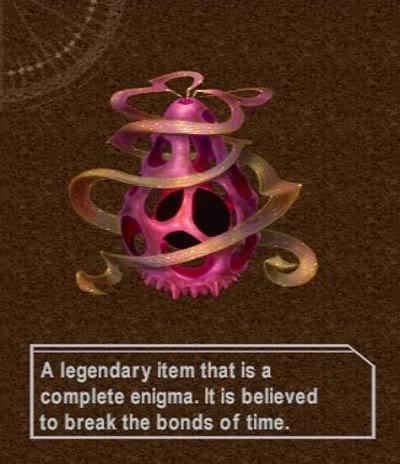
But that's the easy bit. It's already been established as possible in the setting, if difficult, with people nearby to help in the matter. The real rub of the matter is changing what happened without actually changing it - to craft an illusion where what he at first thought to have happened, did not happen at all. This is the only way to avoid time paradoxes.
To do that, he needs a powerful artifact, and to find such an artifact he will need to request one from a cosmic entity. Even invoking this entity is enough to shatter the cosmos a little, form a breach between countless alternate realities - alternate versions of him, each of them having walked different paths in life, each of them under different difficulties, each of them wishing for something entirely different.
And one of them is evil. And what he wishes is for a way to traverse between dimensions, so that he might steal the wishes of all the other versions of himself. The rest of them will, therefore, have to team up in order to do battle with this one evil version of themselves.

I think I'm digressing from the original point a little bit, now. So yeah. Pendulums. Remember them.

Picture a pendulum (sharp edge and a bound victim optional). To write a dramatic plot event - demise, defeat, twist, even triumph - is to lift the pendulum high up with your hand. To later undo this event - raise the dead, bring back the evil empire, otherwise return to the status quo - is to let go. Then what does the pendulum do? It swings all the way to the other side, almost as high as you brought it in the first place. It takes an appropriate time and effort to get done, holds the equal weight and force to how it once was, and its consequences will be felt for a long while.
None of this should need any saying, I don't think. It's one of those unspoken rules that most of us already know about, at least subconsciously - may even have written down in some book somewhere that I've never read. When something happens, it sticks.
And yet - it's much too common for this rule to be broken, especially in comic books and any other long-runners. Characters are brought back from the dead all the time. No prison ever holds the bad guy. Both heroes and villains switch sides... but only briefly. Romances and love struggles, that took an entire movie or book to go through, are brought back to null before the sequel so that the hero would be free to romance a new girl. The Spellplague. The First Order. Return of Bhaal. This thing:

Great twists and whammy plot events that change everything... only to be brought back to normal with little to no fanfare, usually because status quo is (or feels like) the only thing that sells, the comfortable and familiar that the fans have learned to know and love. The pendulum has been brought high and far - but it is only an illusion, because when it comes down, it does not shift to the other side at all... meaning, by the laws of force and gravity, it could never have gone very high to begin with! Such a cheap resolution undermines all the drama and stakes that were involved in the first place.
Why do these heroes even care if someone dies? Why do they try to put the villains away, knowing it doesn't stick? Why struggle for change, when nothing ever can? What is the point?

This is almost assuredly the biggest reason to why I was always so off-put by the new Star Wars trilogy. The original trilogy represented many years' worth of struggles, of triumphs and defeats, of pain and effort, for so many characters. The Empire was brought low with the blood and sweat and tears of all these heroes, these jedi knights and smugglers and rebels working together, many dead or dismembered in the process. The victory was earned, and it felt that things were getting better now.
Only for the new trilogy to completely pull the rug from underneath them. Han and Leia spent three movies getting together, only for them to break up again and their child turned to a villain. Luke was to raise the Jedi Order from the ashes, only to have completely brought it to ruin. Anakin redeemed himself by destroying the evil Emperor, only for him to have just popped back up in some cop-out. And all of this was done off-screen: if it had followed the rule, and spent a whole trilogy or two plotting this out and slowly bringing everything back to hell, it might have been good, great even - but no, none of that. Shame on all of them.
Done well, undoing something is a springboard for new and wild adventures - which is what I'm doing. I did not start on this journey just to return things how they were, because I regret having the tragedy happen in the first place or because some fans hated it; I went on to it because the characters themselves would like to get it fixed, and I'm getting some good ideas on how to do that. I'm still a bit of two minds on whether to go ahead with it at all, or to have them live with their mistakes and head on into the future with the baggage... whatever creates the best drama and the best new story hooks, I suspect.
So how would I do it? How to undo a tragedy without making it meaningless?
Time travel.

But that's the easy bit. It's already been established as possible in the setting, if difficult, with people nearby to help in the matter. The real rub of the matter is changing what happened without actually changing it - to craft an illusion where what he at first thought to have happened, did not happen at all. This is the only way to avoid time paradoxes.
To do that, he needs a powerful artifact, and to find such an artifact he will need to request one from a cosmic entity. Even invoking this entity is enough to shatter the cosmos a little, form a breach between countless alternate realities - alternate versions of him, each of them having walked different paths in life, each of them under different difficulties, each of them wishing for something entirely different.
And one of them is evil. And what he wishes is for a way to traverse between dimensions, so that he might steal the wishes of all the other versions of himself. The rest of them will, therefore, have to team up in order to do battle with this one evil version of themselves.

I think I'm digressing from the original point a little bit, now. So yeah. Pendulums. Remember them.
Published on April 11, 2020 08:36
•
Tags:
back-from-the-dead, cop-outs, first-order, happy-ending-override, pendulum, plot-developments, plot-twists, star-wars, the-one, time-travel, tragedy, umbra-verse, undermining-drama, underworlds
February 26, 2020
Free books! Three at the price of zero!
I haven't had a giveaway for a while, and with a bit of plotting about I managed to put all three into one at the same time. For the rest of the week, The Straggler's Mask, Scourge of the Silver Wings, and Last Gasp to Bygone Stars are all available on Amazon for precisely zero dollars! You may not care for the genre or the content but you've nothing to lose!
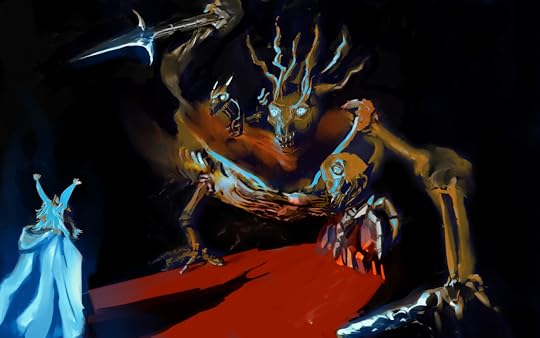
(A battle against skeletal horror centipede not guaranteed to take place in any of these.)

(A battle against skeletal horror centipede not guaranteed to take place in any of these.)
Published on February 26, 2020 02:43
•
Tags:
amazon, art, artwizard, free-stuff, giveaway
February 16, 2020
Just what IS fate, anyway?
This stuff comes up a fair bit in fantasy of any kind, and occasionally science fiction and other genres. The idea that some things are just meant to happen. That the main character is the Chosen One, destined to defeat evil. That the villain is destined to a horrendous demise. That two particular strangers are fated to meet by a road one day. You get the idea.

But it's a whole lot less common for these works to even try and explain the nature of this fate. Why does it want this guy to kill the bad guy? What does it care about some people having a chance meeting? What are its goals, its motives, and where did it come from? And what does it all mean for the opposing concepts of choice and free will?
Most of the time the whole thing just feels like a story convenience. A way to easily explain out all those little coincidences that get the plot running, without wasting too much time in it. But I've been thinking about it a lot lately and so I thought I'd try and cut it up to see what's inside.

From the way it's usually explained in-universe, it strikes to me as a sort of a cosmic breath or pulse, where all things go the way they're supposed to. Rivers run downhill, moons orbit planets and planets orbit suns, sun shines, birds sing, and a magically-talented little girl survived the destruction of her kingdom to meet with a Witcher in a peasant hut. If these things would not happen, then it would cause discord: little skipping of a beat or two, ragged breath or a cough, the sort. No one necessarily wants any of this stuff to happen, it's just all the things in the cosmos, great and small, going on as they would. You can fight it, but only if you know what you're fated to do: otherwise you'll just end up going exactly into its arms.

The opposite interpretation is that there is a higher power, or many higher powers, actively meddling in the worldly affairs - sometimes getting into scraps with one another - messing with people, empowering their own champions, throwing around curses, and anyone that can't handle it is just going to be swept aside like they were nothing. What's free will, is just what choice there is left after all the greater beings have made their plays. A child should not disobey their parents; a peasant would be unwise to defy his king; and even the greatest hero must tread lightly when challenging the gods. You can make it work - you can succeed, even get out of it with your skin - but most likely you'll pay a heavy price for your foolishness.
I like to employ both. The ones more Lawfully-aligned prefer the former explanation, as it makes them feel like they were a part of some greater whole; the Chaotics subscribe to the latter, for they can then seek a sponsor for their pursuit of power and greatness.
Peal thinks both are a bunch of nonsense. In his own words:
"If the river had the will to move uphill, it could. If Titan fancied to revolve the other way for a change, she might. I've seen the former happen and heard of the latter - and taken part in men revolting against kings, and helped children stand up to their parents, even given a Lord of Chaos the slip.
What you call 'Fate' is nothing more than the easy way out - the path of least resistance. An excuse to justify not making any decisions of your own, and going with the flow, the mob. To hell with that. Stop for a moment. Think it through. Seize control over your own life. Walk ever the thorniest path."
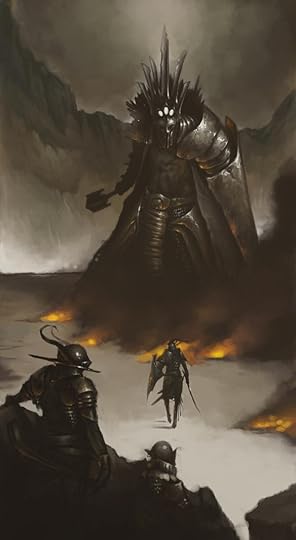

But it's a whole lot less common for these works to even try and explain the nature of this fate. Why does it want this guy to kill the bad guy? What does it care about some people having a chance meeting? What are its goals, its motives, and where did it come from? And what does it all mean for the opposing concepts of choice and free will?
Most of the time the whole thing just feels like a story convenience. A way to easily explain out all those little coincidences that get the plot running, without wasting too much time in it. But I've been thinking about it a lot lately and so I thought I'd try and cut it up to see what's inside.

From the way it's usually explained in-universe, it strikes to me as a sort of a cosmic breath or pulse, where all things go the way they're supposed to. Rivers run downhill, moons orbit planets and planets orbit suns, sun shines, birds sing, and a magically-talented little girl survived the destruction of her kingdom to meet with a Witcher in a peasant hut. If these things would not happen, then it would cause discord: little skipping of a beat or two, ragged breath or a cough, the sort. No one necessarily wants any of this stuff to happen, it's just all the things in the cosmos, great and small, going on as they would. You can fight it, but only if you know what you're fated to do: otherwise you'll just end up going exactly into its arms.

The opposite interpretation is that there is a higher power, or many higher powers, actively meddling in the worldly affairs - sometimes getting into scraps with one another - messing with people, empowering their own champions, throwing around curses, and anyone that can't handle it is just going to be swept aside like they were nothing. What's free will, is just what choice there is left after all the greater beings have made their plays. A child should not disobey their parents; a peasant would be unwise to defy his king; and even the greatest hero must tread lightly when challenging the gods. You can make it work - you can succeed, even get out of it with your skin - but most likely you'll pay a heavy price for your foolishness.
I like to employ both. The ones more Lawfully-aligned prefer the former explanation, as it makes them feel like they were a part of some greater whole; the Chaotics subscribe to the latter, for they can then seek a sponsor for their pursuit of power and greatness.
Peal thinks both are a bunch of nonsense. In his own words:
"If the river had the will to move uphill, it could. If Titan fancied to revolve the other way for a change, she might. I've seen the former happen and heard of the latter - and taken part in men revolting against kings, and helped children stand up to their parents, even given a Lord of Chaos the slip.
What you call 'Fate' is nothing more than the easy way out - the path of least resistance. An excuse to justify not making any decisions of your own, and going with the flow, the mob. To hell with that. Stop for a moment. Think it through. Seize control over your own life. Walk ever the thorniest path."

Published on February 16, 2020 15:48
•
Tags:
chaos, clockwork, cosmic-balance, destiny, explaining-stuff, fate, law, pawns
February 5, 2020
Drowsy Bones - a short-story, starring Peal, has been completed
I've started up three or four short stories, and one rather the large and complex series of notes for a longer book, in these past couple months - only to grow weary of them and abandon them halfway. They always start so strong, too, like five thousand words the first day when my mood is still high and I think it might go somewhere! And then it won't. Alas. Until now!
Total word count is 18,816 words - since 14th of the last month, averaging to barely 800 words a day. It's not too fast, perhaps, but I am extremely satisfied with how it turned out, thinking like it might feature some remotely unique worldviews, a bit of good character growth, and Inverse Ninja Law applied on skeletons.
...And of course as soon as I take a break, I feel all weird and like I had to get back to writing again. I might return to one of those unfinished ones.
Total word count is 18,816 words - since 14th of the last month, averaging to barely 800 words a day. It's not too fast, perhaps, but I am extremely satisfied with how it turned out, thinking like it might feature some remotely unique worldviews, a bit of good character growth, and Inverse Ninja Law applied on skeletons.
...And of course as soon as I take a break, I feel all weird and like I had to get back to writing again. I might return to one of those unfinished ones.
Published on February 05, 2020 15:59
•
Tags:
bones, fatigue, incomplete-drafts, peal, poor-pace, short-stories, skeletons, story-notes, struggle, writing
January 22, 2020
We Fear Spoilers Too Much
What with how pretty much every living human being knows the twist in the relation between Doctor Jekyll and Mister Hyde, reading the original book - where it's still treated as some big mystery - feels a little surreal. And not in a bad way. The book prompts me to revisit the issue of spoilers, and why I never thought much of them.

Say you're reading a book with some big twist towards the end - a character dies, reveals they're a traitor or somebody's dad, whatever - that completely redefines everything you'd read so far. Having managed to remain unspoiled by the twist, when you finally do get to this point, what do you feel? Surprise, likely shock, possibly betrayal, a great stab in the heart, rage and tears, deep suffering.
Genuine and gripping emotions, for certain... but none of these feelings last. They're all based on the surprise, and surprise fades away quite quickly - and then you can never be fooled by it again. You know what happens now, and cannot forget. And in order to pull this off, you likely had to go out on your way to avoid them - insisting your friends and fellow forumgoers to not spoil them for you, closing your eyes or ears if it looks like something's up, even isolating yourself from all human contact until you've read the whole thing through. It's such a huge effort for such a short-term thrill.
So what if you were spoiled in advance?

You'd likely be pretty pissed about it for a while - but that too is a transient emotion. Eventually, while still perhaps fuming a little, you would pick up the book... but the whole thing will have changed for you, compared to your friend who was not spoiled by it. There's a new kind of tension there now. New perspectives. A thrill that lasts you throughout the entire reading, however long it will take you, rather than stabbing you in the heart once and then letting you be.
If you know a character is going to die - then he does not have plot armor, and every time he engages in something deadly you will fear for his life. Is this where he will fall?
If you know a character is a traitor - then everything he says throughout the book will have an entirely new meaning to you. You can see beyond the facade he's putting for the rest of the cast. You're on to his lies.
If you know these two characters are brother and sist-

Hoo boy.
I've also found myself being taken far more off-guard by the other, lesser twists when I know of a big one coming. Maybe it's because I focus on the one I know about, thus letting myself be blindsided by the others. Or maybe because I subconsciously think I already got spoilered for the whole thing, and that no other twists exist, and... you get the idea. I get more out of them anyway.
I do not fear spoilers. I often read about books or games on the internet while halfway through, without being horribly fussed if I learn of a big twist before it happens. I've even considered spoiling something of my own books, well in advance, if I ever got a big enough of an audience that it would make any difference. Perhaps one day.
That being the case, it's still everybody's own choice. If you've read this far, given what I've said due consideration, but still think you wouldn't want to be spoiled about anything and will try to avoid them, go for it. And if someone insists on spoiling for you anyway even though you've specifically told them not to, then they're just being a dick.
I guess what I'm trying to say is that everyone just should relax a bit about the whole thing. But that's just me.

Take it easy, kitty. Put down the knife.

Say you're reading a book with some big twist towards the end - a character dies, reveals they're a traitor or somebody's dad, whatever - that completely redefines everything you'd read so far. Having managed to remain unspoiled by the twist, when you finally do get to this point, what do you feel? Surprise, likely shock, possibly betrayal, a great stab in the heart, rage and tears, deep suffering.
Genuine and gripping emotions, for certain... but none of these feelings last. They're all based on the surprise, and surprise fades away quite quickly - and then you can never be fooled by it again. You know what happens now, and cannot forget. And in order to pull this off, you likely had to go out on your way to avoid them - insisting your friends and fellow forumgoers to not spoil them for you, closing your eyes or ears if it looks like something's up, even isolating yourself from all human contact until you've read the whole thing through. It's such a huge effort for such a short-term thrill.
So what if you were spoiled in advance?

You'd likely be pretty pissed about it for a while - but that too is a transient emotion. Eventually, while still perhaps fuming a little, you would pick up the book... but the whole thing will have changed for you, compared to your friend who was not spoiled by it. There's a new kind of tension there now. New perspectives. A thrill that lasts you throughout the entire reading, however long it will take you, rather than stabbing you in the heart once and then letting you be.
If you know a character is going to die - then he does not have plot armor, and every time he engages in something deadly you will fear for his life. Is this where he will fall?
If you know a character is a traitor - then everything he says throughout the book will have an entirely new meaning to you. You can see beyond the facade he's putting for the rest of the cast. You're on to his lies.
If you know these two characters are brother and sist-

Hoo boy.
I've also found myself being taken far more off-guard by the other, lesser twists when I know of a big one coming. Maybe it's because I focus on the one I know about, thus letting myself be blindsided by the others. Or maybe because I subconsciously think I already got spoilered for the whole thing, and that no other twists exist, and... you get the idea. I get more out of them anyway.
I do not fear spoilers. I often read about books or games on the internet while halfway through, without being horribly fussed if I learn of a big twist before it happens. I've even considered spoiling something of my own books, well in advance, if I ever got a big enough of an audience that it would make any difference. Perhaps one day.
That being the case, it's still everybody's own choice. If you've read this far, given what I've said due consideration, but still think you wouldn't want to be spoiled about anything and will try to avoid them, go for it. And if someone insists on spoiling for you anyway even though you've specifically told them not to, then they're just being a dick.
I guess what I'm trying to say is that everyone just should relax a bit about the whole thing. But that's just me.

Take it easy, kitty. Put down the knife.
Published on January 22, 2020 07:46
•
Tags:
cats, jekyll-and-hyde, naruto, spoilers, star-wars
January 14, 2020
Animal companions, conservation of detail, and emptiness
A couple times now I've tried to give Peal an animal companion to follow him around and help him out a bit, and every time I come to better realize how such things simply don't seem to work in books, or if they do, then I have no idea how.
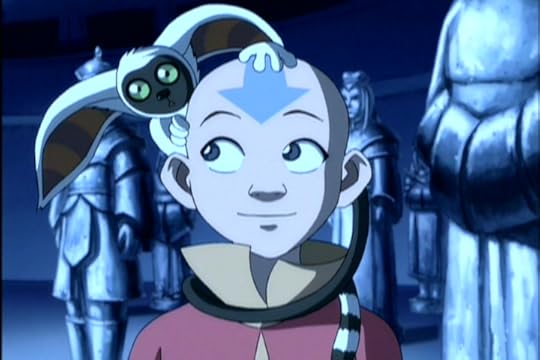
In a more visual medium such as comics or cartoons, animal companions always have something to do: it's a simple thing to get them into a second or two of funny hijinks in between the actual plot stuff, or being petted by someone, or even just lounging in the background to remind us that they exist.
But it's all so much harder to write about. You need to be more conservative with the written word: everything you put on paper has to have more of a purpose, as there's really no foreground or background - there's just ground, just the same words for everyone. What would be a funny bit of shenanigans in the back, or a half-second cut, now stands equal to the important stuff.
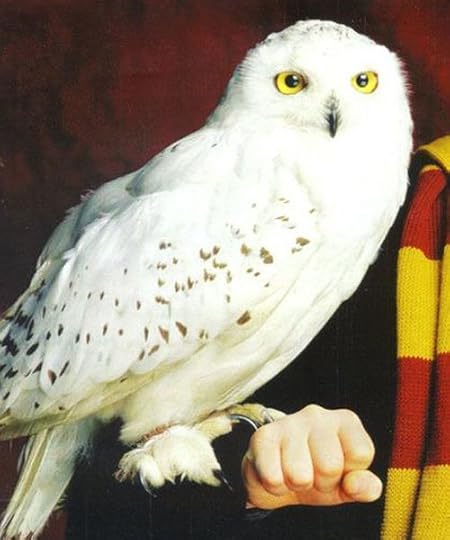
If there wasn't mail to be delivered or other plot stuff she had to be present for, Hedwig was never at the scene at all. She'd have had nothing to do - she couldn't even make a witty remark that a comic relief character might have used to remain relevant. In the end, we'd have forgotten she even existed at all. Or at the opposite end, her hooting about and pecking at people would have gotten in the way of everything, in-universe and out of it.
The thing that arose this point was me writing a short story involving, among other things, a wolf approaching Peal to beg for scraps, then following him around for a while. In a cartoon it would've been a no-brainer - give him someone to hang out with, so that he wouldn't need to be all alone in the wilds; some more variety to scenes, a bit of levity, and cuteness value; occasionally even being helpful to him. The vast majority of cartoon heroes had their animal buddies, but in literature it's so much rarer, rarer still to be done in a remotely meaningful way.
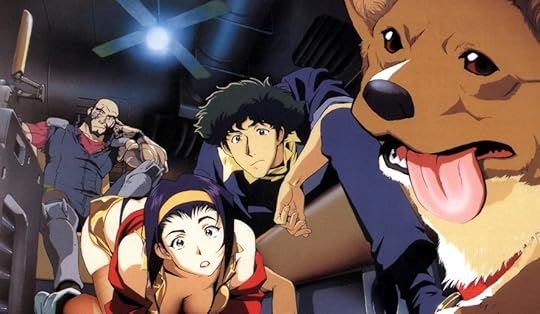
Shame.

In a more visual medium such as comics or cartoons, animal companions always have something to do: it's a simple thing to get them into a second or two of funny hijinks in between the actual plot stuff, or being petted by someone, or even just lounging in the background to remind us that they exist.
But it's all so much harder to write about. You need to be more conservative with the written word: everything you put on paper has to have more of a purpose, as there's really no foreground or background - there's just ground, just the same words for everyone. What would be a funny bit of shenanigans in the back, or a half-second cut, now stands equal to the important stuff.

If there wasn't mail to be delivered or other plot stuff she had to be present for, Hedwig was never at the scene at all. She'd have had nothing to do - she couldn't even make a witty remark that a comic relief character might have used to remain relevant. In the end, we'd have forgotten she even existed at all. Or at the opposite end, her hooting about and pecking at people would have gotten in the way of everything, in-universe and out of it.
The thing that arose this point was me writing a short story involving, among other things, a wolf approaching Peal to beg for scraps, then following him around for a while. In a cartoon it would've been a no-brainer - give him someone to hang out with, so that he wouldn't need to be all alone in the wilds; some more variety to scenes, a bit of levity, and cuteness value; occasionally even being helpful to him. The vast majority of cartoon heroes had their animal buddies, but in literature it's so much rarer, rarer still to be done in a remotely meaningful way.

Shame.
Published on January 14, 2020 04:12
•
Tags:
animal-companions, anime, avatar-the-last-airbender, cartoons, cowboy-bebop, harry-potter, literature, mascots, pets
December 10, 2019
The Dilemma of Winter and Summer
'Tis the season, and so I want to get in the mood by reading warm cheerful winter stuff, listen to Christmas songs, play Jazz Jackrabbit holiday episodes... but all my current notes and inspirations pertain a summer city heatwave!
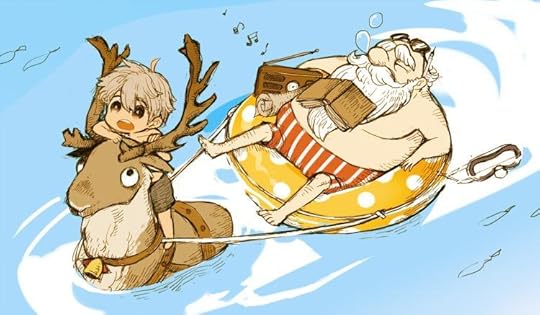
The main antagonist wants to open a portal to another dimension. I'm thinking that other dimension is going to be very, very cold. Also, the city will catch fire.

The main antagonist wants to open a portal to another dimension. I'm thinking that other dimension is going to be very, very cold. Also, the city will catch fire.
December 4, 2019
Somebody's death kicks off the story. Again.
You may not realize it - it's only cropped up in one of my published stories out of three - but I have a big tendency of opening my books with someone important having just died. This would be the fifth time, at least, that I remember on top of my head.
It's an easy way to begin. The story leaps down running, the stakes are set high, and anyone can relate to the surviving protagonist even if you know nothing of them at this stage - just watching them run for their lives will have you invested.
At the same time, not every story needs to open at such high tension. Maybe this time around I could take my time, have a chapter or two to establish the characters, including the one about to die, so that you might learn to care about them in a safe enviroment before dropping the bomb?

To be honest, I struggle coming up with a good other place to begin, or how to write it down. But that's just all the more reason to go for it: all the worthwhile things to do are hard, and it'll teach me a new lesson or two on the way.
It's an easy way to begin. The story leaps down running, the stakes are set high, and anyone can relate to the surviving protagonist even if you know nothing of them at this stage - just watching them run for their lives will have you invested.
At the same time, not every story needs to open at such high tension. Maybe this time around I could take my time, have a chapter or two to establish the characters, including the one about to die, so that you might learn to care about them in a safe enviroment before dropping the bomb?

To be honest, I struggle coming up with a good other place to begin, or how to write it down. But that's just all the more reason to go for it: all the worthwhile things to do are hard, and it'll teach me a new lesson or two on the way.
Published on December 04, 2019 01:23
•
Tags:
character-death, cliches, openings, plot-triggers
November 27, 2019
I wrote a scifi short story
Both of my books so far have been pretty long, but I've gotten around to writing a few short stories as well, as I think I may have mentioned. Here's one.

Last Gasp tells the tale of the last and the only planet in the universe, wherein some people make a startling discovery and begin to see a way to escape the terrible cold end of their dying sun.
It should be available for free from tomorrow on. Maybe you can give it a read then. It's quite a bit shorter.

Last Gasp tells the tale of the last and the only planet in the universe, wherein some people make a startling discovery and begin to see a way to escape the terrible cold end of their dying sun.
It should be available for free from tomorrow on. Maybe you can give it a read then. It's quite a bit shorter.
Published on November 27, 2019 03:09
•
Tags:
end-of-the-universe, free-promotion, science-fiction, scifi, short-story, time-travel
November 13, 2019
Thank you for participating in the Giveaway
I just came back from tossing the books into the mail. The three winners should be getting them sometime in the next couple weeks, luck permitting. They come from pretty much the opposite end of the world, so it may be a while.
Thanks again for taking part! And if you didn't win this time, let it be known that the ebook is currently free! As is the first book, for that matter, so you could grab that too.
Thanks again for taking part! And if you didn't win this time, let it be known that the ebook is currently free! As is the first book, for that matter, so you could grab that too.
Published on November 13, 2019 06:27
•
Tags:
free-ebook, giveaway, mail, print-copies, worry
Pankarp
Pages fallen out of Straggler's journal, and others.
Pages fallen out of Straggler's journal, and others.
...more
- Juho Pohjalainen's profile
- 352 followers



